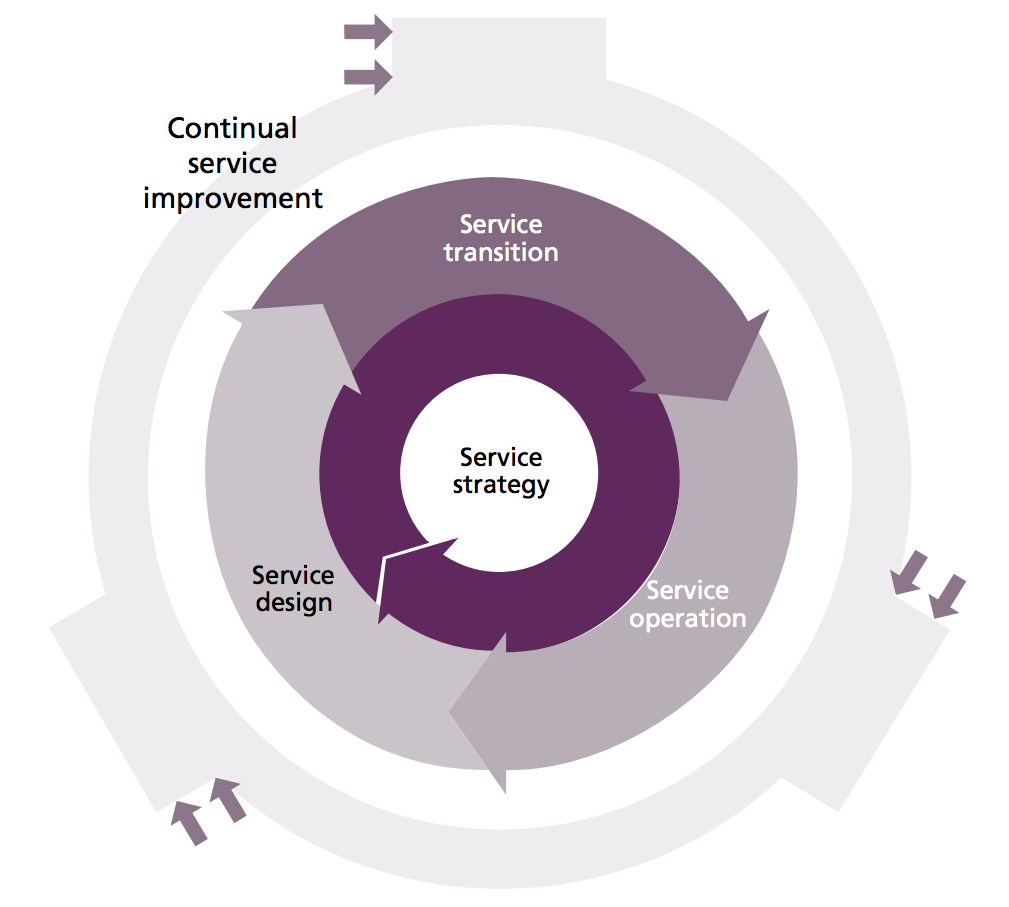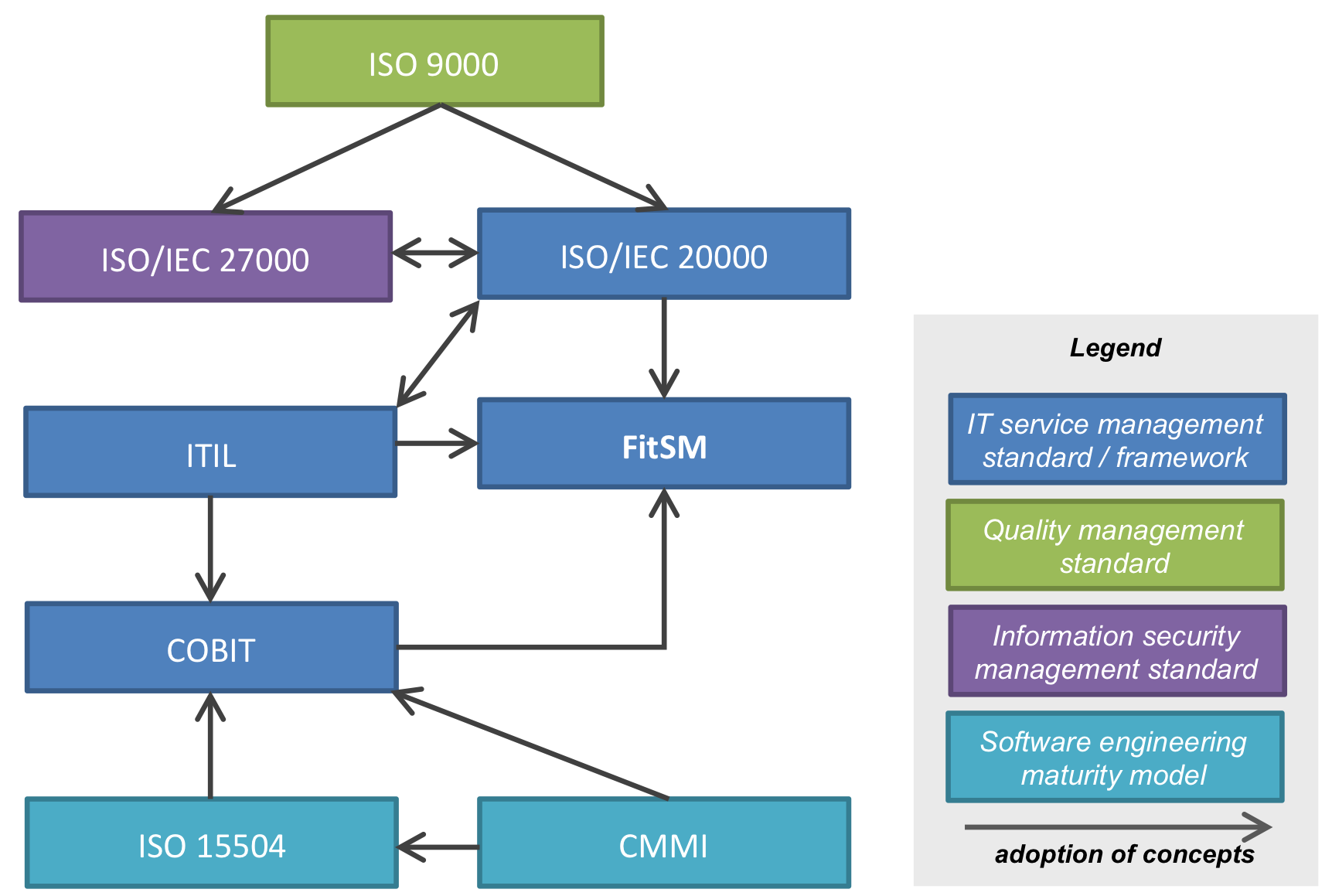CIS 527
ITIL: The Information Technology Infrastructure Library
Sources:
- ITIL for Dummies, 2011 Edition by Peter Farenden
- Wikipedia - ITIL
- Axelos
Q: Wha?
- ITIL is a set of books about IT service management
- It is designed to advise providers about industry standard practices and methods
- IT services following ITIL should keep customers happy!
History of ITIL
- 1980s - Set of Recommendations from the UK Central Computer and Telecommunications Agency
- 1990s - 30+ Volumes of Info
- 2000s - 9 "sets" of guidelines
- 2007 - 5 Volumes, 26 Processes, 4 Functions
ITIL Today
- 2011 Edition from UK Office of Government Commerce
- Significant update to 2007 edition, same structure
- Owned by AXELOS Ltd since 2013
- AXELOS licenses use of ITIL and accredits certifications
The Books
- Service Strategy
- Service Design
- Service Transition
- Service Operation
- Continual Service Improvement
26 processes, 4 functions

Image Source: Axelos
Service Strategy
- Strategy Management for IT Services
- Service Portfolio Management
- Financial Management for IT Services
- Demand Management
- Business Relationship Management
Source: Axelos
Service Design
- Design Coordination
- Service Catalog Management
- Service Level Management
- Availability Management
- Capacity Management
- IT Service Continuity Management
- Information Security Management
- Supplier Management
Service Transition
- Transition Planning and Support
- Change Management
- Service Asset and Configuration Management
- Release and Deployment Management
- Service Validation & Testing
- Change Evaluation
- Knowledge Management
Service Operation
- Event Management
- Incident Management
- Request Fulfillment
- Program Management
- Access Management
- Service Desk Function
- Technical Management Function
- IT Operations Management Function
- Application Management Function
Continual Service Improvement
- Seven-Step Improvement Process
Why is this a Big Deal?
- IT is complex
- IT is always changing
- Users' needs are changing
- Customer satisfaction is important
- Bad management costs money
ITIL Maturity Levels
- Absence (Chaos)
- Initial (Reactive)
- Repeatable (Active)
- Defined (Proactive)
- Managed (Pre-Emptive)
- Optimized
Source: Axelos
0 - Absence (Chaos)
- Very little organization (if any)
- No structure or management
- Inconsistent
1 - Initial (Reactive)
- "Putting out fires"
- Little documentation of procedures
- No pro-active planning
- Outcomes vary based on staff assigned to task
- No automation of tasks
2 - Repeatable (Active)
- Some resources are available
- Defined goals and objectives
- Procedures exist, but may not be fully documented
- Staff roles are recognized but may not be formally defined
- Some automation is being used
Defined (Proactive)
- Starting to work pro-actively, but bulk is still reactive
- Procedures are documented & updated
- Minimal variation between staff
- Roles are defined & assigned to staff
- Mistakes and procedure failures are the exception
Managed (Pre-Emptive)
- Risks are mitigated
- Strong documentation & metrics
- Very automated
- Relationships and dependencies between services are mapped & understood
- Performance is measured & assessed
Optimized
- Consistent and reliable area-wide
- Improvements are actively sought
- Monitored, reviewed and reported
- IT planning is part of business planning
- Processes are audited for effectiveness
ITIL Restaurant - Strategy
- What type of food?
- Location
- Look and feel
- Competitors
- Future plans
Source: Cask LLC
ITIL Restaurant - Design
- Menu Items
- Operating Hours
- Staffing Needs
- Training
- Customer Experience
ITIL Restaurant - Transition
- Prepare and Test Food
- Ensure quality and timeliness
- Validate staff training
- Details - payment, take-home
- Fix problems as found
ITIL Restaurant - Operations
- Customer enters, is seated, and orders
- Ticket is sent to kitchen for prep
- Food order is fulfilled
- Customer requests handled timely
- Complaints are tracked and addressed
ITIL Restaurant - CSI
- Review customer suggestions and feedback
- Identify trends and possible fixes
- Find and eliminate inefficiencies
- Look to the future
- Adapt to changes in industry
Your Turn!
- Shopping Center
- Fitness Center
- Daycare
- Auto Repair Shop
- Airline
- Academic Department
- Bank
Strategy, Design, Transition, Operations, CSI
Assignments
- Lab 7 - Backups & Monitoring - Due Friday May 5th by 11:59 PM
- Create Backup & Monitoring Strategies
- Turn in on K-State Canvas!
